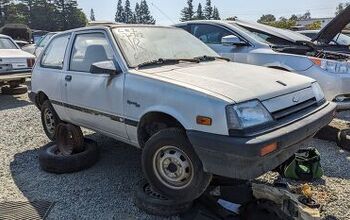Ask the Best and Brightest: Have the Feds Done Too Much or Too Little for Detroit?
Diners at the Motown bailout banquet are back at their tables, their plates groaning under the weight of federal “investment.” They’re just now beginning to tuck in, spending your hard-earned money on various plans to achieve what Oliver called “that full-up feeling.” The reluctant chefs (70 percent of American opposed GM and Chrysler’s second bailout) are showing signs of nausea. While the anti-GM/Chrysler bailout backlash has not been statistically analyzed (I wonder why), anecdotal evidence suggests that at least a small percentage of car buyers are shunning the welfare queens’ products as a protest against their government “affiliation.” Meanwhile, political analysts on both sides of the spectrum continue to debate the elections in Maryland and New Jersey, wondering if voters are rejecting the Obama administration’s heavy-handed economic intervention in the U.S. economy. Did I say “heavy-handed?” Plenty of pundits believe that not only did Uncle Sam have every right to nationalize GM and Chrysler, but they didn’t go far enough. What’s that all about?
There is a line of thought that says the twenty-five (now four) member Presidential Task Force on Automobiles should have laid waste to GM’s entire management structure—not just its failed CEO—and then rolled-up its sleeves and taken charge of GM. Process, products, marketing, everything. They consider the GM bailout, and the “assistance” provided broke-ass banks, timid half measures. Government Motors should BE government motors. For a while, anyway.
[Chrysler gets a pass on this hands-on meme, thanks to blind faith in its new Italian overlord, the charismatic Fiat boss Sergio Marchionne.]
Here’s what New York Times columnist Paul Krugman had to say on the meta-level:
The World War II battle of Anzio was a classic example of the perils of being too cautious. Allied forces landed far behind enemy lines, catching their opponents by surprise. Instead of following up on this advantage, however, the American commander hunkered down in his beachhead — and soon found himself penned in by German forces on the surrounding hills, suffering heavy casualties.
The parallel with current economic policy runs as follows: early this year, President Obama came into office with a strong mandate and proclaimed the need to take bold action on the economy. His actual actions, however, were cautious rather than bold. They were enough to pull the economy back from the brink, but not enough to bring unemployment down.
Thus the stimulus bill fell far short of what many economists — including some in the administration itself — considered appropriate. According to The New Yorker, Christina Romer, the chairwoman of the president’s Council of Economic Advisers, estimated that a package of more than $1.2 trillion was justified.
Meanwhile, the administration balked at proposals to put large amounts of additional capital into banks, which would probably have required temporary nationalization of the weakest institutions. Instead, it turned to a strategy of benign neglect — basically, hoping that the banks could earn their way back to financial health.
For me, this is some scary-ass shit. The glass isn’t half full; it isn’t even a quarter full. It’s virtually empty! And fill it we must! Failure isn’t a sign that we were misguided. It’s a sign that we were too timid! We must re-double our efforts and INCREASE federal intrusion.
Do you agree? Should the feds have taken full control of GM and Chrysler? If the automakers face cash starvation yet again, should we up our “investment”? And if not, at what point do you kick them out of the cafe?
As for the Battle of Anzio, commanders who fail to achieve an objective tend to blame limited resources rather than their own lack of skill and resolve. Winston Churchill (and military historian John Keegan) laid the blame for Anzio’s failure on the timidity of Major General John P. Lucas. The larger question remains: should the allies have attacked there in the first place?
More by Robert Farago
Latest Car Reviews
Read moreLatest Product Reviews
Read moreRecent Comments
- MaintenanceCosts RAM! RAM! RAM! ...... the child in the crosswalk that you can't see over the hood of this factory-lifted beast.
- 3-On-The-Tree Yes all the Older Land Cruiser’s and samurai’s have gone up here as well. I’ve taken both vehicle ps on some pretty rough roads exploring old mine shafts etc. I bought mine right before I deployed back in 08 and got it for $4000 and also bought another that is non running for parts, got a complete engine, drive train. The mice love it unfortunately.
- Statikboy I see only old Preludes in red. And a concept in white.Pretty sure this is going to end up being simply a Civic coupe. Maybe a slightly shorter wheelbase or wider track than the sedan, but mechanically identical to the Civic in Touring and/or Si trims.
- SCE to AUX With these items under the pros:[list][*]It's quick, though it seems to take the powertrain a second to get sorted when you go from cruising to tromping on it.[/*][*]The powertrain transitions are mostly smooth, though occasionally harsh.[/*][/list]I'd much rather go electric or pure ICE I hate herky-jerky hybrid drivetrains.The list of cons is pretty damning for a new vehicle. Who is buying these things?
- Jrhurren Nissan is in a sad state of affairs. Even the Z mentioned, nice though it is, will get passed over 3 times by better vehicles in the category. And that’s pretty much the story of Nissan right now. Zero of their vehicles are competitive in the segment. The only people I know who drive them are company cars that were “take it or leave it”.


































Comments
Join the conversation